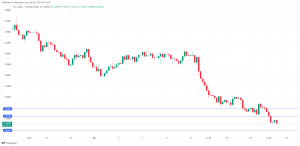Economics
Silicon Valley Bank Collapse: Sifting for lessons in the damage
Mainstream eyes focused squarely on the banking sector after news broke that Silicon Valley Bank (SVB) had collapsed. We’d just seen the biggest bank…

Mainstream eyes focused squarely on the banking sector after news broke that Silicon Valley Bank (SVB) had collapsed. We’d just seen the biggest bank failure since 2008. What lessons can, and should, we learn from the wreckage of the 16th-largest bank in the US? We spoke to experts to find out.
How did UK businesses react to the demise of Silicon Valley Bank?
The SVB saga played out with frightening speed, leaving many founders uncertain and experts watching it play out with bated breath. “With deposits being pulled and the dramatic share price drop, it certainly became apparent that this could severely change the financial sector. It also became clear that the tech sector, in particular, would be affected, with thousands of tech businesses facing the reality of their financial lifeline cut off,” said Susannah Streeter, Head of Money and Markets at Hargreaves Lansdown.
SVB was recognised as a key player for innovative ecosystems but its revenue model ultimately become its noose. “In a traditional banking environment, a bank’s balance sheet is made by active and passive, with coordinated durations to avoid liquidity crises,” said Dr Massimo Preziuso, Lecturer in Financial Technology at the University of Salford Business School. “SVB didn’t follow this rule, which is particularly important when your deposits are made by start-ups that operate under high uncertainty and cash burn, further increased in the turbulent environment of 2022-23.”
On the ground, the tech community was scrambling to make sure that they could pay staff and keep their vision afloat. “Many good startups, scale-ups and pre-IPO companies were intertwined with SVB,” said Konstantin Sidorov, Founder & CEO of London Technology Club. “We spent the weekend taking calls from VCs, investors and our members. Founders that have built exciting, possibly transformational companies that are the future of our economy had done nothing wrong here. We couldn’t let the brakes be put onto good companies and investors’ funds. Whilst the news certainly gave investors a nervous weekend, it’s a reminder of the importance of tech for future economies and how fragile the current economic situation is.”
Russ Shaw CBE, Founder of Tech London Advocates & Global Tech Advocates, was a central figure in the tech sector’s response to the news. “When the news started to evolve late last Friday evening, it was clear that the collapse of SVB was going to have a significant impact on the UK tech community,” said Shaw. “But once we established that up to 40% of UK start-ups held accounts or a relationship with SVB, it became apparent that this could be devastating. Together with industry leaders, a WhatsApp group was formed to ensure that the government heard from affected businesses experiencing high levels of anxiety about their future. This group ultimately effectively communicated the extent of the problem and galvanised government action.”
Along came the White Knight
“We know of some founders in our network who woke up last Friday with basically no business,” said Ifty Nasir, Co-Founder and CEO of Vestd, the first regulated share scheme platform for UK SMEs. “Thankfully, the support was delivered and a major crisis was averted, HSBC’s rescue deal offered comfort to SVB UK’s 3,000 business customers after a stressful saga for start-ups.”
Government and tech leaders were praised for making the deal happen, and HSBC’s intervention was roundly praised. However, with Wednesday’s Budget announcement looming large, the good sentiment didn’t extend to banking policy. “I started my business in 2006, so it was almost a flashback to the crisis of 2008,” said Richard Lowe, Managing Director at Hewlett Rand and Founder of Tech West England Advocates. “Obviously, this is an isolated incident but it does make you think about how vulnerable the system is, even though they’d changed the regulation.”
“When the bank was taken over and a backstop was put in place by the Treasury, the initial feeling was this could be contained. However, the banking sector was rattled and then questions started to be asked…,” said Streeter. “How was this allowed to happen in the first place? SVB essentially tried to make long-term bets on short-term money, by using short-term deposits to buy long-term Government bonds (which of course had dropped in value).”
With the immediate threat seemingly nullified, the focus switched to the longer-term ramifications of the HSBC takeover. One factor raised by many experts was around life after the takeover.
“I think HSBC has a much different culture and profile to that of Silicon Valley Bank,” said Evan Rudowski, experienced tech adviser and Co-Founder of SubHub. “It’s hard for me to imagine that HSBC will operate in the same kind of way, with the same understanding of start-ups and what their financial needs are.”
A sentiment echoed by Sidorov: “The problem for tech in the UK, which is Europe’s leading tech ecosystem, has often been the conservative compliance of the big banks – which is where SVB filled a much-needed hole. If HSBC applies the same compliance and business standards as they have now for SVB UK, they’ll severely hamper the bank, and the bank will not be a successful partner for the UK tech industry.”
[contact-form-7]
What lessons should business leaders learn from the SVB saga?
While the banking sector has regulatory factors they need to implement to ensure we don’t experience a crisis like this again, there are several lessons for start-ups and business leaders to take from SVB’s demise. “It’s kind of cyclical,” said Rudowski. “Every 10 or so years, there’s going to be some dramatic event that’s unanticipated and that riles the markets and changes the way the game is played. So, I think founders have to be prepared for that.”
“It always comes back down to the basics… running your business in a fundamentally thoughtful and sound way. Yes, you want to invest. Yes, you want to grab market share when the opportunity presents itself. Sometimes you have to spend to do that, but at the same time, be thoughtful and pay attention to the details of cash flow. Metrics like revenue per employee or other things that tell you whether your business is on the right track and that you’re managing things well and don’t keep all of your money in one bank account.”
“The era of cheap money has come to an end,” says Streeter. “These tech companies were able to raise large sums because there was a lot of money washing around. These VCs were able to borrow and lend out, rather than invest.”
This is a sentiment shared by Dr Massimo Preziuso: “SVB has made clear that the bill of the cheap money era has to be paid. The risk now is that speculation will try to push this crisis further. Governments will probably need to partially adjust their monetary policy, possibly in a coordinated way, and intervene to support further tensions which could happen in other financial institutions.”
“More than anything, the collapse has taught us all the importance of getting the right advice and being flexible,” comments Nasir. “One common mistake of the businesses who were affected by the SVB collapse had it as their only bank where they invested their money. This saga proves that is not always a wise decision and it’s best to spread the risk.”
Richard Lowe says the same should apply to banks: “We need to build into the banking system, not just regulations, but red flags around banks having too many eggs in baskets, spreading the risk so that they don’t get into liquidity risk.”
Krista Griggs, Head Of Financial Services & Insurance at Fujitsu UK, agrees that more needs to be baked into the system to make sure an SVB-esque event is avoided in future. “Resilience during economic turbulence requires comprehensive stress testing to identify potential vulnerabilities in a bank’s operations, balance sheets, and risk management processes. Asset diversification, hedging strategies, and robust interest rate risk management should also be implemented. Banks must establish contingency plans for crisis scenarios and provide frequent updates and transparency to investors and depositors. Financial institutions must learn from crises and collapses to safeguard their business models against similar future events. Collaboration among banks, regulators, and stakeholders is crucial for continuous learning and adaptation.”
“Despite its collapse, the sheer volume of tech businesses who chose to bank with SVB highlights their deep understanding of the global tech ecosystem and what it means to be a start-up,” says Russ Shaw. “HSBC, and the wider banking sector, should take this as an opportunity to lean into this field and demonstrate their knowledge of the start-ups sitting at the forefront of innovation in the UK and their ability to support these businesses through the unique challenges they face.”
Those who do not learn history are doomed to repeat it, but the irony of the story is that SVB played a large hand in their own downfall.
“Silicon Valley Bank lobbied to relax regulations that would have subjected them to greater oversight, which might very well have prevented this from happening,” said Rudowski. “Since they successfully got those regulations removed, they were able to behave in a way that increased their risk.
“One thing we need to learn is that regulation can be our friend. It helps to enable markets to run smoothly and for people to have confidence in those markets. So maybe we should not always be looking to remove regulation at every opportunity.“
The post Silicon Valley Bank Collapse: Sifting for lessons in the damage appeared first on Business Leader.

Argentina Is One of the Most Regulated Countries in the World
In the coming days and weeks, we can expect further, far‐reaching reform proposals that will go through the Argentine congress.
Crypto, Crude, & Crap Stocks Rally As Yield Curve Steepens, Rate-Cut Hopes Soar
Crypto, Crude, & Crap Stocks Rally As Yield Curve Steepens, Rate-Cut Hopes Soar
A weird week of macro data – strong jobless claims but…
Fed Pivot: A Blend of Confidence and Folly
Fed Pivot: Charting a New Course in Economic Strategy Dec 22, 2023 Introduction In the dynamic world of economics, the Federal Reserve, the central bank…















